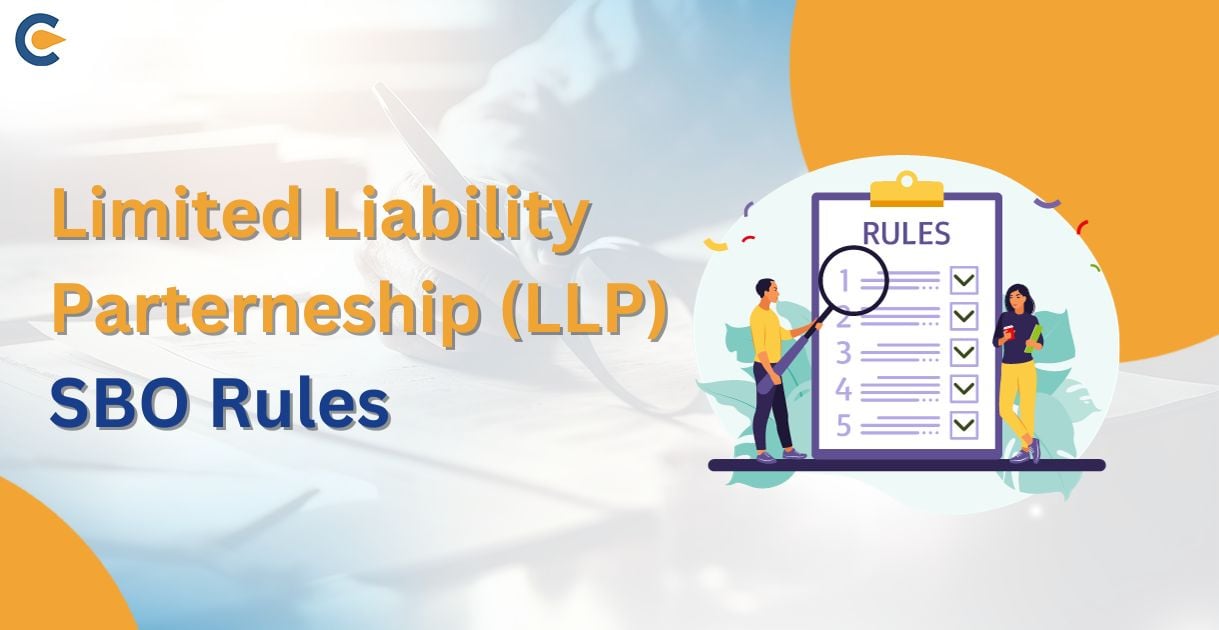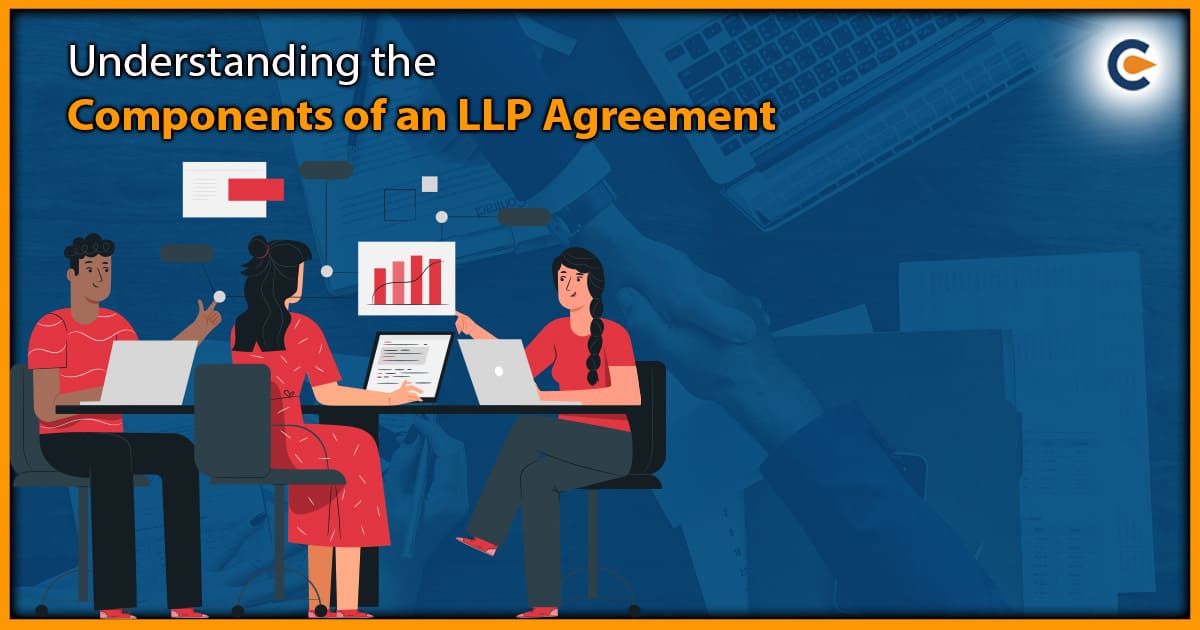LLPSBORules created obligations on Significant Beneficial Owners and Limited Liability Partnerships. The Companies Act, 2013 (the “Act”), Section 90, required people designated as Significant Beneficial Owners (or “SBOs”) for firms to declare their status. This provision was adopted by the Ministry of Corporate Affairs (MCA) in 2018. Then, by notice dated February 11, 2022, MCA expanded the scope of the aforementioned regulation to include Limited Liability Partnerships (LLPs). However, the announcement raised questions and concerns about how SBO regulations were being applied to LLPs. The most current notification, titled “LLP SBO Rules,” dated November 9, 2023, addresses these worries. This expansion is justified by the need to bring the framework for LLP SBO identification more in line with those of corporations.
While the requirements are identical to those set out for businesses under the Act, the main distinction is how the SBOs in the case of LLPs are determined. For limited liability partnerships (LLPs), the computation is predicated on the possession of capital contributions (shares for companies), voting privileges regarding the management or policy decisions of the LLP (shares for companies), and the entitlement to receive or partake in distributable profits (dividends for companies) or any other distribution. Additionally, the right to exert control or substantial influence in any way save direct holdings is taken into account.
Framework and Applicability
Effective date and applicability of LLP SBO Rules
The Ministry of Corporate Affairs in India created the LLP SBO Rules in order to identify and regulate those who possess a considerable amount of control or interest in LLPs. These regulations, which are applicable to all LLPs established in India, went into force on November 10, 2023.
Exemptions for Certain Types of Contributions
Certain contributions are exempt from the LLP SBO Rules in the following situations:
- When the beneficial interest is held through Securities and Exchange Board of India (SEBI)-regulated mutual funds, alternative investment funds, real estate investment trusts, or infrastructure investment trusts.
- If the person has no rights or benefits in the LLP, either directly or indirectly, as a result of a contract or other arrangement.
- If the person has a beneficial interest that is less than a percentage that is stipulated by the regulations.
Key Differences in Determining SBOs for LLPs Compared to Companies
- Nature of Ownership: In corporations, ownership is ascertained by shareholding; in limited partnerships, ownership is evaluated by means of the partnership deed and capital contribution.
- Calculation of Significant Beneficial Ownership: The SBO criterion for businesses is usually 10% or higher of capital, voting rights, or shares. It is decided in LLPs according to the profit-sharing ratio or capital contribution as specified in the LLP agreement.
- Exclusions and Exemptions: As previously indicated, the LLP SBO Rules offer exclusions for a number of individual and contribution categories that may not be the same as those offered under the Companies Act.
These regulations were put in place to improve the ownership structure of limited liability partnerships (LLPs) and bring them into line with international norms for combating money laundering and guaranteeing regulatory compliance. In order to keep accurate records of people having significant influence or interests in the LLPs and to promote transparency in their activities, it is necessary to identify and disclose Significant Beneficial Owners.
Understanding Significant Beneficial Ownership (SBO)
In the context of a reporting limited liability partnership (LLP), comprehending significant beneficiary ownership (SBO) entails a number of understandings pertaining to the definition, rights, entitlements, requirements, and identification criteria:
Definition of SBO in Relation to A Reporting LLP
An individual who directly or indirectly retains a substantial portion of the LLP’s beneficial ownership or control is referred to as an SBO. Moreover, SBOs are determined by the LLP SBO Rules according to their ownership of shares or right to LLP earnings.
Rights and Entitlements Defining an Individual as an SBO
Anyone is considered an SBO if they are entitled to the following rights or privileges:
- The right to a certain portion of the LLP’s earnings or distribution.
- The authority to exert a sizable amount of influence or control over the operations or administration of the LLP.
- The authority to name or dismiss the majority of the authorized partners of the LLP or to exercise other forms of control over the partnership.
Prerequisites for Holding Indirect Rights or Entitlements
Ownership or control that is exerted through organizations or institutions is referred to as indirect rights or entitlements.
Conditions should be met in order to determine indirect rights or entitlements:
- Determining ownership or control through tiers of organizations or structures (such as corporations, trusts, or other LLPs).
- Figuring out the final person or people who use these arrangements to exert a lot of control over or profit from the LLP.
Identification of Individuals as SBOs in Different Partner Structures
Within an LLP, different partner configurations may make it more difficult to identify SBOs. These arrangements might be:
- Individual Partnerships: An individual’s direct ownership or interest in a partnership.
- Corporate Partnerships: These involve a firm owning a stake in the partnership.
- Complex Structures: These involve several levels of companies or trusts owning LLP interests, necessitating a careful investigation to determine the final beneficial owners.
Identifying ownership and control rights through the LLP agreement, partnership deeds, capital contributions, profit-sharing ratios, or other papers controlling the LLP’s operations is necessary to identify SBOs in different partner configurations. In order to maintain transparency and regulatory compliance within the LLP’s ownership structure, compliance with the LLP SBO Rules requires the disclosure of people who meet the requirements for SBO status as well as their corresponding ownership or control interests.
Obligations of Significant Beneficial Owners (SBOs)
Important Beneficial Owners (SBOs) in an LLP is required to provide initial and ongoing disclosures, with particular attention to submitting Form No. LLP BEN-1 and providing updated information about any changes to their status throughout the transition period.
Timeline for filing Form No. LLP BEN-1
- Initial Disclosure: SBOs must submit Form No. LLP BEN-1 no later than ninety days following the start of the LLP SBO Rules, that is, ninety days following the rule’s effective date or ninety days after becoming an SBO.
- Changes in SBO Status: The SBO must file Form No. LLP BEN-1 within 30 days of any changes to their shareholding pattern or SBO status occurring in compliance with LLP SBO Rules.
- Changes in SBO during the Transition Period: During the transition period, any changes to the SBO’s status or to their significant beneficial ownership should be quickly reported.
Within 30 days after the occurrence of any change in beneficial ownership or control within the LLP, the SBO is required to notify the LLP by completing the necessary form (LLP BEN-1).
These duties, which require the SBOs to provide current information on their beneficial ownership or control in the LLP, guarantee transparency and regulatory compliance. It is crucial to follow the disclosure requirements outlined in the LLP SBO Rules since noncompliance might result in fines or legal repercussions.
Obligations of Limited Liability Partnerships (LLPs)
The identification of Significant Beneficial Owners (SBOs), the filing of returns, and the upkeep of registers in accordance with the LLP SBO Rules are among the responsibilities of Limited Liability Partnerships (LLPs).
Steps for Identifying SBOs
- LLPs are required to request information on beneficial ownership from partners who possess 10% or more of the LLP’s contributions or voting rights.
- Partners are required by the notice to either request information from their other partners or disclose facts regarding their beneficial interest in the LLP in the manner specified.
Filing of Return and Maintenance of Register
- Submission of Form No. LLP BEN-2 to the Registrar of Companies: After receiving information from partners contributing 10% or more, LLPs have 30 days to complete Form No. LLP BEN-2 with the Registrar of Companies. Details of the SBOs that the LLP has discovered are included in this form, which was created using data that it received from its partners as per LLP SBO Rules.
- Maintenance of Register of SBO in Form No. LLP BEN-3:The details of the SBOs must be kept up to date in an LLP’s Register of Significant Beneficial Owners, which is kept on Form No. LLP BEN-3.This register must be kept up to date at the LLP’s registered office and be accessible for examination by partners, authorized authorities, and LLP members.
- Accessibility and inspection of the register: During business hours, partners, authorized partners, and LLP members should be able to view the Register of SBO kept on Form No. LLP BEN-3.In addition, this record may be inspected and accessed by regulatory bodies in accordance with the LLP SBO Rules, including the Registrar of Companies and any other official designated by the government.
These responsibilities guarantee that LLPs follow the LLP SBO Rules’ requirements for openness and reporting. In order to comply with regulations and avoid abuse or non-disclosure of significant beneficial ownership in limited liability partnerships (LLPs), it is imperative that SBOs be promptly identified, returns are filed, and registers containing correct information about them are maintained.
Remedial Measures through Tribunal
When reporting LLPs encounter problems as a result of non-cooperation or violations of the LLP SBO Rules, or when Significant Beneficial Owners (SBOs) fail to comply, remedial procedures may be pursued through the National Company Law Tribunal (NCLT).
Application to NCLT in case of non-compliance by SBOs
- The reporting LLP may file a complaint with the National Company Law Tribunal (NCLT) to seek appropriate remedies if an SBO violates the requirements outlined in the LLP SBO Rules.
- In order to challenge the non-compliant SBO, the reporting LLP may submit an application to the NCLT, outlining the particular non-compliance issues, such as failure to give information, false information, or any other duty breach according to LLP SBO Rules.
- In order to force the non-compliant SBO to perform their responsibilities and give correct information about their major beneficial ownership or control in the LLP, the application to the NCLT may ask for actions or directions.
Possible Remedies Available to the Reporting LLP
- Direction to Comply: The non-compliant SBO may get directives from the NCLT requiring them to adhere to the LLP SBO Rules within a given amount of time.
- Imposition of Penalty: If the non-compliant SBO fails to adhere to the requirements outlined in the LLP SBO Rules, the tribunal has the authority to impose fines or penalties.
- Deprivation of Rights: The NCLT may even order steps to restrict or limit the rights or entitlements of the non-compliant SBO within the LLP in extreme circumstances of non-compliance or purposeful false information.
- Extra Orders: The NCLT has the authority to issue any further directives or orders that are judged essential to guarantee adherence to the regulations or to address any issues resulting from non-adherence to the SBO as per the LLP SBO Rules.
Exemptions from SBO Rules
To the extent that the reporting LLP’s contribution is retained, these regulations will not apply. –
- The federal, state, municipal, or other government agencies; a reporting limited liability partnership (LLP);
- A corporate or other entity under the control of the federal, state, or local governments;
- Investment vehicles registered with and governed by the SEBI, including mutual funds, alternative investment funds (AIFs), Infrastructure Investment Trusts (InVITs), and Real Estate Investment Trusts (REITs).
- A financial instrument that is subject to regulation by the Indian Reserve Bank, Insurance Regulatory and Development Authority, or Pension Fund Regulatory and Development Authority.
- The holding reporting company’s exemption to a subsidiary for the submission of SBO information has not been extended to an LLP. As a result, in the event that one LLP owns another LLP, both organizations must individually adhere to the standards.
Conclusion
One of the most important steps toward improving accountability and transparency in the ownership structures of Limited Liability Partnerships (LLPs) in India has been the implementation of Significant Beneficial Owner (SBO) Rules. In order to guarantee adherence to international anti-money laundering standards and advance regulatory transparency, these laws seek to identify persons with significant control or interest in limited liability partnerships (LLPs). Certain categories’ exemptions, which include holdings made through regulated corporations and people without direct entitlements, take into account the subtleties of ownership arrangements. The LLPs are required to maintain registers, seek remedies, and disclose information. These requirements highlight the need for accurate and timely reporting and promote integrity and compliance with regulatory standards.
FAQs
The Limited Liability Partnership (Significant Beneficial Owners) Rules, 2023, which were notified by the Ministry of Corporate Affairs on September 11, 2023, require every Limited Liability Partnership (LLP) to determine whether any of the individuals are significant beneficial owners with regard to reporting LLPs. Upon identification, the individual is required to make a declaration.
A beneficial owner is defined by financial rules as any individual or entity that owns 25 per cent or more of a corporation or other legal entity. Anybody who plays a major role in the administration or direction of those businesses, as well as trusts that control at least 25% of those entities, can also be regarded as a beneficial owner.
All reporting limited liability companies (LLPs) should take the appropriate measures to ascertain if any person is an SBO with respect to that LLP, identify that person, and compel that person to provide a declaration in Form No. LLP BEN-I.
Such a person must provide a statement to the reporting LLP in Form No. LLP BEN-1 within ninety days of the new regulations taking effect, or by November 10. After receiving the information, the business has 30 days from the date of the declaration to submit it to the Registrar of Companies.
If a person with substantial beneficial ownership withholds information, the LLP may file a complaint with a tribunal. Regarding the contribution, the LLP may request limitations on the transfer of interest, suspension of the right to earn profits, or suspension of voting rights.
After receiving SBO’s declaration, the reporting LLP has 30 days from the day it received the declaration to make a return in Form No. LLP BEN-2 with the Registrar of Companies.
November 10, 2023, marked the effective date of the LLP SBO Rules. Limited Liability Partnerships (“LLPs”) in India will have to identify and report their substantial beneficial owners (SBOs) following the implementation of these LLP SBO Rules.
In the event that the member is a corporation, the natural person holding at least ten percent of the shares, whether acting alone, in concert with other natural persons, or via one or more other individuals or trusts, is the Significant beneficial owner.
An alternative corporate structure known as a limited liability partnership (LLP) combines the advantages of a partnership with the restricted liabilities of a corporation.
Within 30 days of obtaining the Significant beneficial ownership or any change therein, any individual who later becomes an SBO or in which there is a change to the substantial beneficial ownership must make a declaration in Form No. LLP BEN-1 to the reporting LLP.
Read Our Article: Understanding the Components of an LLP Agreement










